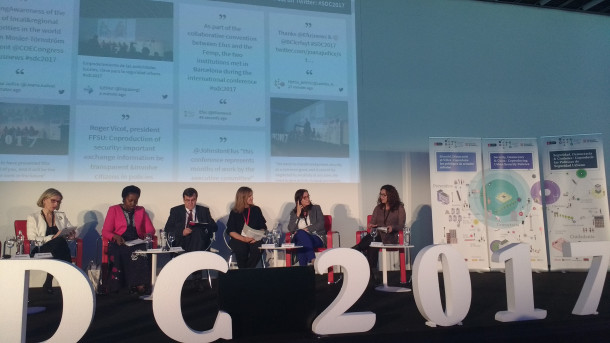
Gender equality
Incorporating a Gender Vision in Urban Security
From the 15-17 of November the International Conference of the European Forum of Urban Security (EFUS) on “Security, Democracy and Cities: a Joint Production of Urban Policies on Security” was held in Barcelona. During the conference, a workshop on “Prevention of Violence against Women” co-organized by Metropolis was held, and attended by Mrs. Maria Naredo, the director general of Awareness and Prevention for Gender Violence in the Municipality of Madrid.
The activity contributed to Metropolis´ vision of incorporating gender in European security policies, as well as addressing the issues of violence against women and girls in public spaces.
In the first part of the event, Mrs. Nared stated the importance of gender incorporation in public policy and the ways in which this has shaped the planning and focus of policies through three difference parameters: “First, relating to the notion of security, and the role of subjectivity (fear). Second, the dichotomy between spaces as, until now, public spaces were considered unsafe while private spaces, safe, something not entirely true in the case of women. Last, is the introduction of agents of change to improve security, alongside the participation of social and community networks.”
Along these lines, the coordinator of Gender Hub of Hábitat, Mrs. Ana Falú, stressed the key role of women in the development of public security policies as, “Women have been and are continuing to push for a radical agenda defending human rights and fighting for issues of urban violence and security”.
In the second part of the workshop, Mrs. Naredo addressed the issue of policy development through multilevel governance as well as the involvement of diverse actors: “We must not divide public and private spaces, but rather, approach them as one. To reach this goal, the merging of security policies and citizen participation is crucial, as engagement at the local, neighborhood and district level is necessary to involve all citizens in order to convey clear messages to both women and their potential aggressors”.
Finally, Mrs. Falú emphasized the importance of setting the empowerment of women at the center of the joint security policy production as well as the significance of working on the three city pillars: 1) material pillar: friendly spaces and safe transport; 2) institutional pillar: resource allocation and capitation policies 3) symbolic/cultural pillar: the implementation of informative campaigns on sexual violence against women in public spaces.
The session concluded with the need for incorporation of gender in urban policies, through consistency between public and private spaces on the issue of violence, as well as the importance of placing women´s experiences at the center of policies. This vision outlined the way in which the training and empowerment of women and public administration can serve as a transversal strategy to generate citizen awareness on issues of gender, funded by public resources.

